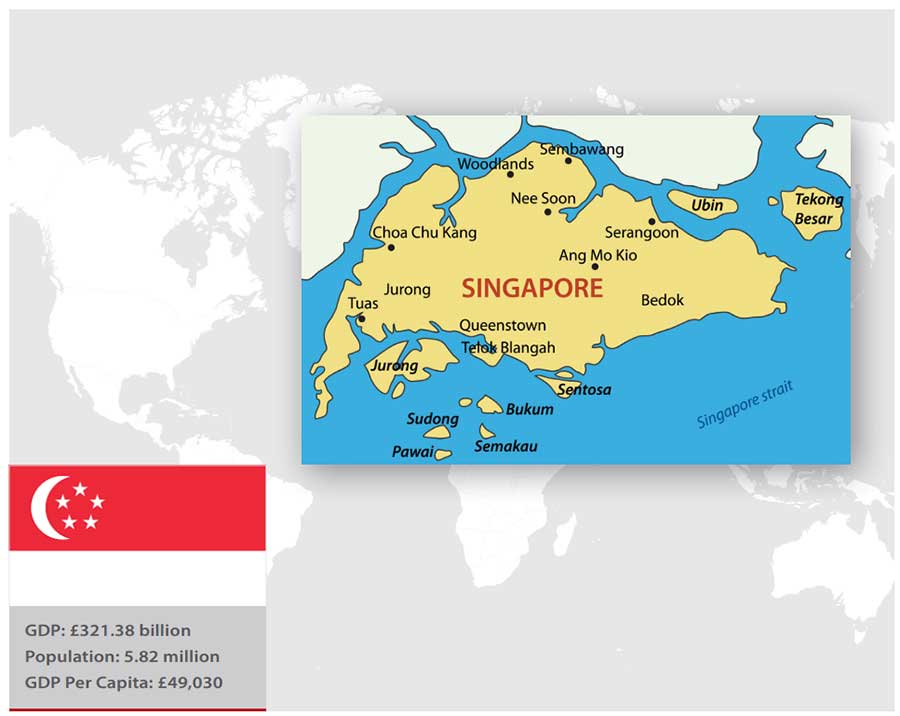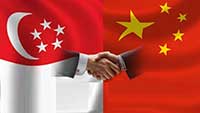Britain and China’s Trade & Investment Competition In Singapore

New unique economic data and analysis show very different approaches to Asian trade and investment policies from the UK and China
By Asia Investment Research
The United Kingdom’s exit from the European Union (Brexit) has left the country looking for new trade partners. Much of this has centred upon Asia, where the UK maintains relatively strong ties with members of the Commonwealth, namely Bangladesh, Brunei, India, Malaysia, Maldives, Pakistan, Sri Lanka, and Singapore.
A question that has arisen is how the United Kingdom can emulate some of the more admirable and palatable traits of China’s own expansion into Asia. In this article, extracted from the new issue of Asia Investment Research, titled ‘Britain and China’s Trade and Investment Competition in Asia’ (complimentary download here), we explore the differing dynamics between Chinese and British investment policy in Singapore – of use to both British businesses looking at the region as well as ASEAN investors evaluating the potential for UK trade.
Singapore-China

Background
In 1994, Singapore and China launched the Suzhou Industrial Park (SIP) project. One of the world’s first Special Economic Zones, attracting manufacturing via low tax rates, in the 30 years since the official establishment of diplomatic ties, SIP has been a landmark project and a fore runner of subsequent international/BRI SEZs. Suzhou’s regional GDP in 1994 was circa 72 billion RMB. (US$10 billion, or £8.24 billion). This figure more than doubled to 154 billion RMB in 2000, exceeded 1 trillion RMB in 2011, nearly 2 trillion RMB (US$298 billion, or £245.6 billion) in 2019, trailing only Shenzhen and Guangzhou SEZs, formed circa 1980, and as laid the foundation for Chinese investments into Singapore and the wider ASEAN region ever since.
Trade
In 2021, Singapore-China bilateral trade reached US$97 billion (£79.93 billion), with the balance roughly 10% in China’s favour. What is noticeable in China’s behaviour towards Singapore is that it is returns on infrastructure and technological investments that are driving the profitable element of investment relations while trade, while significant, is a secondary part of the overall economic relationship.
Infrastructure
CCI-ILTSC
Since the founding of China-Singapore (Chongqing) Demonstration Initiative on Strategic Connectivity (CCI) in 2015, over US$17 billion (£14 billion) in cross-border deals (led by Singapore banks) have been signed, US$3 billion (£2.5 billion) in 2021 alone. CCI cross-border financial services helps drive the New International Land-Sea Trade Corridor (ILSTC) a trade and logistics passage jointly built by Singapore and provincial-level regions of western China. (Chongqing is the corridor’s operational centre). Goods from western China can travel south via rail, sea and road to access the markets with shorter time compared with the traditional route from eastern China. CCI-ILSTC serves as a bridge between the Silk Road Economic Belt and the 21st Century Maritime Silk Road.
Other Investments/Commercial Projects
E-commerce
Tencent Shope (Sea) – Tencent participated in five rounds of funding to Sea between 2014 and 2017, investing a total of US$268 million (£221 million). In October 2017, Sea, the Singapore-based digital entertainment firm (formerly known as Garena) raised US$884 million (£728.5 million) in its NYSE IPO. By 2019, Sea’s market cap had climbed to US$18.6 billion; (£15.3 billion) by 2020 to US$101.7 billion (£83.81 billion). In January 2022, Tencent sold 14.5 million shares in Sea in public markets for circa US$3 billion (£2.47 billion). Tencent’s remaining 18.7% stake was worth US$19.3 billion (£15.9 billion).
Alibaba – In 2016, Alibaba initially acquired a 51% stake in Lazada, its e-commerce marketplace in Southeast Asia. In 2017, it added another US$1 billion (£820 million) to its investment increasing its stake to 83%. In 2018, Alibaba added another US$2 billion, doubling its investment to US$4 billion (£2.3 billion). In May 2022, Lazada received a US$378.5 million (£312 million) capital injection from issuing new shares to parent Alibaba Singapore. This raise follows the September 2021 report that Lazada recorded a gross merchandise value (GMV) of US$21 billion (£17.31 billion) ranking it 3rd globally by GMV. Alibaba plans to expand Lazada to Europe (Cainiao; its logistics arm previously opened a hub for European sales in Liege, Belgium).
Digital Banking/Crypto
Greenland Financial Holdings – In December 2020, Greenland Financial Holdings Group Co. Ltd (Greenland), a subsidiary of the Greenland Group (Hong Kong), led a consortium on its successful application for a Digital Wholesale Bank (DWB) licence in Singapore (one of 4 licenses granted). The Monetary Authority of Singapore (MAS) issued a DWB licence to the consortium comprising Greenland, Linklogis Hong Kong Ltd and Beijing Co-operative Equity Investment Fund Management. In June 2022, GREEN Link Digital Bank (GLDB) owned by a consortium began operations, becoming among the first digital bank licensees to launch in Singapore.
Ant Digital Bank – In early June 2022, Ant Group soft-launched ANEXT Bank, a digital wholesale bank in Singapore following MAS approval for the bank to launch. (the license was approved in 2020). ANEXT will focus on providing digital financial services to local and regional micro, small and medium-sized enterprises (MSMSE) and especially those engaged in cross-border operations.
Blockchain/Crypto – In December 2021, Binance Asia Services, the Singapore arm of major cryptocurrency exchange Binance (China), announced that they planned to acquire a stake in a local private securities exchange, Hg Exchange (HGX): the company officially announced the acquisition of a post-money 18% stake in HGX, a stock exchange licensed and regulated by the MAS. Later in December, Binance withdrew its application with the MAS for a digital payment token services license.
AI / Digitisation
In 2018, Baidu teamed up with Asia Mobility Industries (AMI) to launch a new Singapore-based mobility venture fund, called “Apollo Southeast Asia.” This will also help establish a foothold for Baidu to pursue commercialization of its autonomous driving platform in the region, and source strategic partners for its deployment. The fund being launched along with the joint venture includes US$200 million (£165 million) in available investment capital, which will be put into companies working on all aspects of autonomous driving and connected, smart transportation services.
AMI works on AI and mobility services, and since 2019 it has been working with Singapore’s transit authority through one of its subsidiaries to develop smart mobility solutions for the region and is now working with four prominent Chinese companies to drive this technology forward.
AMI has signed a MOU with Geely to develop robo-taxis (AMI believes it can be the largest robo-taxi operator in the region by 2025); has partnered with China’s largest mapping company NavInfo to develop the advanced mapping technologies needed for autonomous taxis; signed a preliminary agreement with CATL to sell its automotive batteries in Singapore, and is planning to bring Baidu’s driverless buses, which began mass production in China last year, to Southeast Asia.
Global Leadership Innovation in Infrastructure Finance
Bayfront (IABS) – In June 2021, AIIB announced that it was committing US$60 million (£50 million) to Bayfront Infrastructure Management’s (Bayfront) debut issuance of infrastructure asset-backed securities (IABS).
AIIB’s anchor investment will set an important benchmark for future IABS, which are a critical part of the market-building process for new asset class creation. Bayfront is a Singapore-based entity with a mandate to invest in and distribute infrastructure debt in the Asia Pacific and Middle East regions. Historically, Asian infrastructure has been primarily financed through bank loans, which are not suitable for many institutional investors due to investment restrictions. IABS can help bridge the infrastructure financing gap by allowing investors to invest in rated and listed debt securities backed by a diversified portfolio of project and infrastructure loans. The total issuance by Bayfront will offer investors access to a US$401 million (£330 million) portfolio of 27 project and infrastructure loans, primarily with an Asian focus, diversified across 13 countries and eight industry subsectors.
This is AIIB’s second investment related to Bayfront, the first as a 30% shareholder Bayfront, approved in 2019. Co-established by AIIB and Clifford Capital, Bayfront is Asia’s first fully-fledged infrastructure securitization platform.
The Keppel Asia Infrastructure Fund – In June 2020, AIIB approved a US$100 million (£82.4 million) investment as a commitment to the Keppel Asia Infrastructure Fund with co-investment rights for another US$50 million. The Keppel Asia Infrastructure Fund is a closed-end private equity fund with a target size of US$1 billion (£820 million). The Fund Manager’s parent company, Singapore-based Keppel Corporation, is a leading Asian brand which has established and diversified infrastructure businesses in the region. Leveraging the Keppel Group’s regional network and project capabilities, the Fund will invest growth and expansion capital into diversified infrastructure projects in the Asia-Pacific region.
Asian Data Centre Development – In October 2021, AIIB announced that it will invest a further US$100 million, again with co-investments up to $50 million, in the Keppel Data Centre Fund II, LP (KDCF II), a closed end PE vehicle managed by Alpha Investment Partners Ltd (Alpha), a wholly-owned subsidiary of Keppel Capital. Since 2004, Alpha has managed six commingled funds and has executed over 190 transactions across key gateway cities with gross acquisition value of more than US$26 billion (£21.43 billion).
KDCF II focuses on the development of data centres, that mostly serve emerging Asia and are designed to promote greener digital infrastructure and cross-border connectivity.
Singapore-UK

Singapore was the UK’s 19th largest trading partner in the four quarters to the end of Q4 2021 accounting for 1.3% of total UK trade.
In 2020, the outward stock of foreign direct investment (FDI) from the UK in Singapore was £14.8 billion, accounting for 0.9% of the total UK outward FDI stock, while in 2020, the inward stock of foreign direct investment (FDI) in the UK from Singapore was £13.5 billion, accounting for 0.7% of the total UK inward FDI stock.
Total trade in goods and services (exports plus imports) between the UK and Singapore was £16.7 billion in the four quarters to the end of Q4 2021, an increase of 4.3% or £693 million from the four quarters to the end of Q4 2020.
In the four quarters to the end of Q4 2021, total UK exports to Singapore amounted to £10.7 billion (an increase of 6.8% or £677 million compared to the four quarters to the end of Q4 2020).
Of all UK exports to Singapore in the four quarters to the end of Q4 2021, £5.0 billion (46.8%) were goods and £5.7 billion (53.2%) were services. In the four quarters to the end of Q4 2021, UK exports of goods to Singapore increased by 9.9% or £451 million compared to the four quarters to the end of Q4 2020 while UK exports of services to Singapore increased by 4.1% or £226 million compared to the four quarters to the end of Q4 2020.
In the four quarters to the end of Q4 2021, total UK imports from Singapore were £6.0 billion (an increase of 0.3% or £16 million compared to the four quarters to the end of Q4 2020).
Of all UK imports from Singapore in the four quarters to the end of Q4 2021, £2.5 billion (42.4%) were goods and £3.5 billion (57.6%) were services. In the same period, UK imports of goods from Singapore increased by 11.0% or £252 million compared to the four quarters to the end of Q4 2020 while UK imports of services from Singapore decreased by 6.4% or £236 million compared to the four quarters to the end of Q4 2020.
This means the UK reported a total trade surplus of £4.7 billion with Singapore, compared to a trade surplus of £4.0 billion in the four quarters to the end of Q4 2020. In the four quarters to the end of Q4 2021, the UK had a trade in goods surplus of £2.4 billion with Singapore, compared to a trade in goods surplus of £2.2 billion in the four quarters to the end of Q4 2020. Meanwhile, in the four quarters to the end of Q4 2021 the UK reported a trade in services surplus of £2.2 billion with Singapore, compared to a trade in services surplus of £1.8 billion in the four quarters to the end of Q4 2020.
The top 5 goods exported from the UK to Singapore in the four quarters to the end of Q4 2021 were:
- 71MI – Mechanical power generators (intermediate) (£1.6 billion or 31.5% of all UK goods exported to Singapore)
- 9 – Unspecified goods (£567.5 million or 11.4%)
- 793 – Ships (£349.0 million or 7.0%)
- 11 – Beverages (£299.2 million or 6.0%)
- 74I – General industrial machinery (intermediate) (£225.1 million or 4.5%)
The top 5 goods imported to the UK from Singapore in the four quarters to the end of Q4 2021 were:
- 71MI – Mechanical power generators (intermediate) (£675.1 million or 26.5% of all UK goods imported from Singapore)
- 54 – Medicinal & pharmaceutical products (£232.7 million or 9.1%)
- 51 – Organic chemicals (£215.3 million or 8.4%)
- 77I – Miscellaneous electrical goods (intermediate) (£151.9 million or 6.0%)
- 28 – Metal ores & scrap (£146.2 million or 5.7%)
The top 5 service types exported from the UK to Singapore in the four quarters to the end of Q4 2021 were:
- Other Business Services (£2.0 billion or 34.8% of all UK services exported to Singapore)
- Transportation (£1.1 billion or 20.0%)
- Financial (£1.1 billion or 19.9%)
- Intellectual property (£530 million or 9.3%)
- Telecommunications, computer, and information services (£336 million or 5.9%)
The top 5 service types imported to the UK from Singapore in the four quarters to the end of Q4 2021 were:
- Other Business Services (£2.3 billion or 65.9% of all UK services imported from Singapore)
- Transportation (£543 million or 15.7%)
- Financial (£439 million or 12.7%)
- Travel (£62 million or 1.8%)
- Telecommunications, computer, and information services (£49 million or 1.4%)
China – UK Weighted Comparison
According to our weighted comparison index, Chinese and UK trade in terms of their commitment to Singapore from their respective GDP bases are about equal. What is apparent however is that it has been Chinese initial investment finance and seed capital that has been a spectacular success for Chinese investors in Singapore, leveraging these investments into huge subsequent capital returns via IPOs in the manner that British investors have just not been part of – a lost opportunity.
 The new issue of Asia Investment Research also contains extensive further analysis of the recent UK-Singapore Digital Services Agreement in addition to UK-China trade and investment comparisons throughout Asia. It can be downloaded on a complimentary basis here.
The new issue of Asia Investment Research also contains extensive further analysis of the recent UK-Singapore Digital Services Agreement in addition to UK-China trade and investment comparisons throughout Asia. It can be downloaded on a complimentary basis here.
About Us
Asia Investment Research is published by Asia Briefing with assistance from Dezan Shira & Associates. The firm advises foreign investors, including a significant British client base, into Singapore and the rest of Asia and has done so for the past 30 years. Please visit www.dezshira.com or contact our Singapore office at singapore@dezshira.com for specific Singapore assistance.





